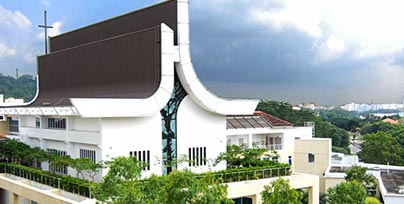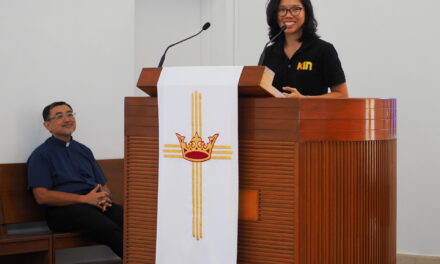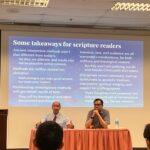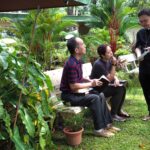
EQUIP

These guidelines govern the conduct of EQUIP programmes, course, and initiatives. Participants consent to these guidelines when register.
1) COURSE STRUCTURE
1.1 Certificate & Licentiate Programmes. EQUIP offers a flexible structure for its certificate and licentiate programmes that provide more focus and flexibility in participants’ choice of courses and workshops. Participants can progress through these programmes at their own pace.
1.2 At Your Own Pace. Alternatively, participants may choose to attend EQUIP Evening Courses (Online) and Workshops (In-Person) as an audit participant (i.e. no assignment at the end of the course) and without signing on to the certificate and licentiate programmes.
1.3 Evening Courses (Online). Each Evening Course (Online) comprises 7 2-hour weekly sessions via Zoom. Participants have to attend a minimum of 5 sessions and pass the course assignments with a minimum of a D grade to complete each course.
1.4 Workshops (In-Person). Each Workshop (In-Person) comprises 3 Saturday morning sessions (830am-1pm) held at TTC. Participants must attend all 3 sessions and pass the course assignments with a minimum of a D grade to complete each workshop.
1.5 Assignments. Course assignments usually comprise of a 1500-2000 word essay or 2-hour examination, but may vary according to the course/workshop or instructor.
2) CERTIFICATE & LICENTIATE PROGRAMMES
2.1 Certificate in Christian Ministry
The Certificate in Christian Ministry (CCM) is a foundational course offered to Christians who wish to have a strong foundation for Christian life and ministry. The broad range of courses and workshops provides opportunities to reflect on and be equipped for various aspects of Christian living and ministry. Participants may choose and successfully complete any 8 EQUIP courses and/or Workshops to be awarded the CCM.
2.2 Licentiate in Christian Ministry
The Licentiate in Christian Ministry (LCM) offers training that goes beyond the certificate-level programmes. It is designed for those who wish to deepen their understanding of scripture and theology, as well as to prepare for effective service. The additional modules give participants the opportunity for a broader-based training that would widen their perspective of Christian ministry. Participants may choose and successfully complete any 16 EQUIP courses and/or Workshops to be awarded the LCM.
2.3 Licentiate in Mission Practice
The Licentiate in Mission Practice (LMP) is offered by Trinity Theological College in partnership with the Singapore Centre for Global Missions (SCGM). The LMP is a new programme introduced in 2024 and replaces the previous Certificate in Mission Practice programme. The LMP comprises a combination of (1) Evening Courses and Workshops and (2) a Practicum. Participants will be able to complete the LMP within 2 years or may take up to 8 years to complete the requirements.
The LMP is designed for:
1. Christians who wish to understand and live into their missional identity and calling;
2. Christians engaging in a variety of emerging missional expressions, modes, or fields;
3. Christians contemplating or preparing for short-term overseas mission assignments of between 6-24 months; and
4. members of church mission boards and mission agencies involved in policy formulation, missionary sending and roles in mission leadership.
2.3.1 Evening Courses and Workshops. The LMP requires participants to complete the following 8 required Evening Courses (Online) and 1 Workshop (In-Person) that will provide participants with robust biblical, historical, and theological foundations and understanding of mission offered over a 2-year cycle and totalling 140 hours (inclusive of the Pre-Practicum Course—see below 2.3.2):
Evening Courses (Online)
1. Old Testament Survey*
2. New Testament Survey*
3. Christian Doctrine*
4. Missio Dei: Historical & Holistic Perspectives
5. Theology of Mission
6. Introducing World Religions
7. Issues in Christian Mission
8. Contextualization and Mission
Workshops (In-Person)
1. Understanding Church Planting and Holistic Mission
(*Those with theological degrees are exempted)
2.3.2 Practicum. The LMP emphasises practice learning and participants must complete either an overseas or local practicum. There are no course/workshop pre-requisites for the practicum and participants may register for either (1) an overseas or (2) a local practicum at any point in their LMP journey. SCGM will coordinate and offer 1 practicum a year, alternating between an overseas and a local practicum. Practicums will run in the 2nd half of each year (June – December). Participants can only take part in practicums organized through SCGM and may not request to use their own local church or other mission agency mission trips as fulfilment of the LMP. The Practicum entails the following activities that total 84 hours:
-
-
- Practicum – EITHER of the following
- OVERSEAS – 5–7-day mission exposure trip (with a minimum of 5 days @ 8hrs each = 40 hours); OR
- LOCAL – 40 hours with a local mission partner over maximum of 3 months
- Pre & Post Practicum Activities
- Pre-Practicum Course – Developing an Incarnational Approach for Cross-Cultural Missions (7x 2-hour sessions; registration and cost will be the same as for an Evening Course (Online) but conducted as part of the Practicum component)
- Pre and Post-Practicum Follow Up Activities (dependent on the nature of the practicum)
- Post-Practicum Debrief
- Submission of a reflection paper of 2500 words
- Practicum – EITHER of the following
-
2.3.3 Funding & Costs. Participants will raise their own funding for air-tickets, accommodation, and living expenses for overseas practicum. All participants will also need to contribute $200 to SCGM as practicum administrative fee.
2.4 Prgramme Completion. Completion of the EQUIP certificate and licentiate programmes are based on a system of credits called EQUIP Points. Participants attend courses to accumulate EQUIP Points to complete the respective programmes. The points requirements to complete the respective programmes are shown in the table below.
| Programme | EQUIP Points |
| Certificate in Christian Ministry | 112 |
| Licentiate in Christian Ministry | 224 |
| Licentiate in Mission Practice | 224 |
Each EQUIP Evening Course (Online) and Workshop (In-Person) is validated at 14 points. The completion of a certificate programme requires the equivalent of 8 EQUIP Evening Courses and/or Workshops. The completion of the licentiate programme requires the equivalent of 16 EQUIP Evening Courses and/or Workshops. The LMP required Evening Courses/Workshop are validated at a total of 140 points and the Practicum is validated at 84 points, totalling 224 points. Participants will need to maintain an average GPA of 2.0 to graduate from the respective programmes.
2.5 Other Initiatives. From time to time EQUIP may offer other initiatives (e.g. special lectures, conferences, or events) of various duration and/or frequency. These initiatives may also be allocated EQUIP points and if so, this will be announced in the publicity materials.
2.6 Time Limits for Completion of Certificate & Licentiate Programmes. The CCM must be completed within 4 years. The LCM and LMP must be completed within 8 years. The Director of EQUIP may approve requests for extensions for valid reasons. The decision of the Director is at his/her own discretion and final. For the avoidance of doubt, if a participant should register for the certificate or licentiate programmes after starting any course/workshop/practicum, their programme shall be deemed to start from the first day of the earliest course/workshop/practicum attended.
2.7 Conversion of EQUIP Credits for TTC Diploma or Degree Programmes.
EQUIP participants who have completed their EQUIP certificate or licentiate programmes may request for the conversion of their EQUIP credits for credit in diploma or degree programmes offered by TTC.
TTC will accord each completed EQUIP course/workshop/practicum with the assignment graded B+ and above 0.5 credit per 14 EQUIP points. An LCM or LMP would equate to 8 TTC credits, and the CCM equates to 4 TTC credits. These credits may only be applied to TTC elective courses.
EQUIP participants must make their request in writing to the Registrar of TTC when registering for their diploma/degree programme. The conversion request is subject to the approval of the Registrar of TTC, whose decision is final.
3) COURSE REGISTRATION
3.1 Course Registration. Courses will available for registration online via Eventbrite 2 months before the start of each quarter and registration closes 1 week before the start of each quarter. EQUIP reserves the right not to approve any course registration without explanation.
3.2 Course Fees. Fees of courses and workshops are as follows:
Evening Courses (Online)
• Standard Registration – $120
• Youth (aged 21 and below) & Full-Time National Servicemen – $30
• Overseas Participants (from Cambodia, Indonesia, Laos, Malaysia, Mauritius, Myanmar, Philippines, Thailand, Timor-Leste and Vietnam) – $30
• TTC Alumni/Current Matriculated TTC Students – Free (Registration Required)
• Spouse of Current Matriculated TTC Students – $60
Workshops (In-Person)
• Standard Registration – $150
• Youth (aged 21 and below) & Full-Time National Servicemen – $37.50
• TTC Alumni/Current Matriculated TTC Students – Free (Registration Required)
• Spouse of Current Matriculated TTC Students – $75
Payments is via Eventbrite by credit card.
3.3 Refunds. Course fees are non-refundable. If a course is postponed, participants may elect to join the course on the new date or receive a full refund. If a course is cancelled, participants will receive a full refund.
3.4 No Trial Sessions. EQUIP does NOT offer trial sessions for prospective participants who wish to try out a course for a week. EQUIP makes every effort to invite highly qualified and engaging instructors for all our courses.
3.5 Replacement of Participants. Participants who are unable to attend a course after registration may request for another person to take their place up to 1 week BEFORE the start of any course. Thereafter, no replacement of participants for a course (or part thereof) will be allowed in order to facilitate a safe and conducive learning community for the other participants of each course. In the case of online courses, participants are reminded that only the registered participant should view and participate in the online course.
4) LEARNING ARRANGEMENTS, RESOURCES & REQUIREMENTS
4.1 Recording by Participants. Participants are not permitted to record their courses/workshops (including the lectures, visuals, and discussions) in any way (including audio, video, screenshots, and photography). Course instructors may make notes, copies of presentation slides, and other materials available to participants at their sole discretion.
4.2 Recording by EQUIP. EQUIP reserves the right to record EQUIP sessions in their entirety and in different formats. Participants consent via the registration process to these recordings and their use for pedagogical or publicity purposes. When EQUIP records sessions, participants who are absent for valid or medical reasons may request for such audio/video recordings subject to the restriction that these recordings may not be disseminated in any way and must be deleted after two weeks (for evening online courses only).
4.3 Access to TTC Library. EQUIP participants are granted complimentary access to TTC library (without borrowing privileges) for the duration of their course. Please present a copy of the letter/email confirming your EQUIP registration to the librarian on duty. Library membership with borrowing privileges (up to 4 books) is also available to EQUIP participants at a fee of $50 for 6 months.
4.4 Assignments. Written assignments should be submitted as a Word document in 12-point font, paginated double-spaced, with one-inch margins on all four sides, and no additional spacing between paragraphs. Sources and quotations must be referenced via footnotes but no bibliography is required. Participants should email their assignments to the EQUIP office ([email protected]) for collation to each course/workshop/practicum instructor.
4.5 Time Limits for Assignments. All assignments must be submitted no later than 2 weeks after the last session of the course/workshop. Instructors may approve requests for extensions for valid reasons for up to a further 2 weeks. No further extension is permitted thereafter without written approval from the Director of EQUIP. Such requests for further extension will not be approved normally unless there are extenuating circumstances and will be subject to the approval of the Director of EQUIP at his/her sole discretion and whose decision is final. When a assignment is not submitted in time and/or passed, the course/workshop will not count toward the completion of the certificate/licentiate programs.
4.6 Video Turned On for Online Courses. Participants in online courses conducted via Zoom or other means are required to keep their video turned on during the duration of an online class/session including in breakout rooms except during breaks designated by the instructor or brief personal/toilet breaks. This requirement serves to create a safe and effective online learning environment and facilitate: i) verification of identity and attendance; ii) participants being present to, and engaged with, the instructor and other participants; and (iii) the shaping of a genuine and effective online learning community for the duration of each course.
GENERAL
5.1 Amendments. EQUIP reserves the right to amend these Guidelines from time to time and participants agree to abide with such amendments. EQUIP will inform participants of such amendments via email.
5.2 Ambiguity or Dispute. In the case of ambiguity or dispute relating to any of the EQUIP courses or initiatives, course arrangements or instructions, these guidelines, and/or any other EQUIP or TTC publication, the determination and decision of the Director of EQUIP will be final.
CONTACT EQUIP
For more information or if you have any questions, please email [email protected].








